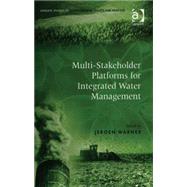- ISBN: 9780754670650 | 0754670651
- Cover: Hardcover
- Copyright: 7/28/2007
Illustrated by a wide geographical range of case studies, this book focuses on water management to take a positive, if critical, look at Multi-Stakeholder Platforms, their effectiveness and their sustainability as a process. Multi-stakeholder Platforms (MSPs) are becoming a very popular mode of involving civil society in debates and decision-making on resource management, as they provide a negotiating space for a diversity of interests. MSPs ideally emerge when stakeholders recognise their interdependence and the shared nature of the problems they are facing.Illustrated by a wide geographical range of case studies from both developed and developing worlds, this book focuses on water management to take a positive, if critical, look at this phenomenon. It recognises that MSPs will neither automatically break down political and institutional divides nor bring actors to the table on an equal footing, and argues that if MSPs promise too much or are based on wrong principles, then they may do more harm than good.The volume then examines how MSPs can make a difference and how they might successfully co-opt the public, private and civil-society sectors. The book highlights the particular difficulties of MSPs when dealing with integrated water management programmes, explaining how MSPs are most successful at a less complex and more local level, rather than at water basin level. It finally questions whether MSPs are, or can be, sustainable and puts forward suggestions for improving their durability.Contents: Preface; The beauty of the beast: multi-stakeholder participation for integrated catchment Management, Jeroen Warner; The nature of the beast: towards a comparative MSP typology, Jeroen Warner and Annemiek Verhallen; Collaborative capital: a key to the successful practice of integrated water resources management, Nigel Watson; Integrated catchment management and MSPs : pulling in different directions?, Bruce Mitchell; Contrasting UK experiences with participatory approaches to integrated river basin management, Malcolm Newson; Aring;rhus convention in practice: access to information and decision-making in a pilot planning process for a Flemish river basin, Annamiek Verhallen; The international Zwin Commission: the beauty of a mayfly?, Leo Santbergen; Participating in watershed management: policy and practice in the Trahunco watershed, Argentinian Patagonia, Alejandra Moreyra and Jeroen Warner; 'Yakunchik': coming to agreement after violence in Peru, Mariacute;a Teresa Oreacute;; Muliti-stakeholder platforms for surface and groundwater management in the Lerma-Chapala basin Mexico, Philippus Wester, Jaime Hoogesteger van Dijk and Hans Paters; Less tension, limited decision: a multi-stakeholder platform to review a contested sanitation project in Tiquipaya, Bolivia, Nicolas Faysse, Vladimir Cossiacute;o, Rauacute;l Ampuero and Bernardo Paz; Multi-stakeholder dissonance in the South African Water arena, Eliab Simpungwe, Pieter Waalewijn and Bert Raven; Mekong region water-related MSPs unfulfilled potential, John Dore; Against the conventional wisdom: why sector reallocation of water and multi-stakeholder platforms do not take place in Uzbekistan, Kai Wegerich; Unpacking participatory NRM: distinguishing resource capture from democratic governance, Bruce Currie-Alder; More sustainable participation? Conclusions and recommendations, Annemiek Verhallen, Leo Santbergen and Jeroen Warner; Index.About the Author: Jeroen Warner is from Wageningen University and Research Centre, The Netherlands.







